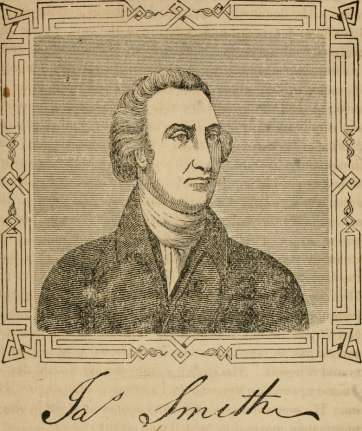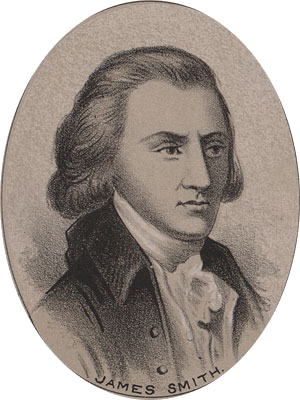James Smith of Pennsylvania

James Smith was born in Ireland, and was quite a small child when brought by his father to this country. The date of of his birth is not recorded, and Mr. Smith himself could never be induced to tell it. It is supposed to be somewhere about 1720. His father, who had a numerous family of children, settled upon the Susquehanna river, in Pennsylvania, and died there in 1761. James was his second son, and, discovering a strong intellect at an early age, his father determined to give him a liberal education. For this purpose he placed him under the charge of Reverend Doctor Allison, provost of the college of Philadelphia. He there acquired a knowledge of Latin and Greek, and what proved more useful to him, practical surveying.
After completing his tuition, he began the study of law in Lancaster, and when admitted to the bar, he removed westward, and practised both law and surveying. The place where he located was very sparsely populated, and indeed was almost a wilderness. The flourishing town of Shippensburg has since sprung up there. After a short continuance in his wilderness home, Mr. Smith moved to the flourishing village of York, where he found no business competition for many years. He married Miss Eleanor Amor of Newcastle, Delaware, and became a permanent resident of York, where he stood at the head of the bar until the opening of the Revolution.

Mr. Smith early perceived the gathering storm which British oppressions were elaborating here ; and when men began to speak out fearlessly, he was among the first in Pennsylvania to take sides with the patriots of Massachusetts and Virginia. He heartily seconded the proposition for non-importation agreements, and for a General Congress. He was a delegate from the county of York to the Pennsylvania convention (which was styled the " Committee of Pennsylvania"1), whose duty it was to ascertain the sentiments of the people, and publish an address. Mr. Smith was a member of the sub-committee chosen to prepare the address, which was in the form of instructions to the representatives of the people in the General Assembly of the state. He was earnest in endeavoring to arouse the people to positive resistance, and as early as 1774, he was in favor of cutting the bond that held the colonies to the British throne.2
When Congress passed a resolution, recommending the several colonies to " adopt such governments as in the opinion of the representatives of the people, might best conduce to the happiness and safety of their constituents," the Pennsylvania Assembly was slow to act accordingly. In fact its instructions to its delegates in Congress were not favorable to independence, and it was not until the people of that state spoke out their sentiments in a general convention, that Pennsylvania was truly represented there. The seats of her delegates, who refused to vote for the Declaration of Independence, and withdrew from Congress, were filled with bold men, and one of these was James Smith, who, with George Clymer and Benjamin Rush, took his seat some days after that glorious instrument was adopted. He was there in time, however, to place his signature to the parchment on the second day of August ensuing.
Mr. Smith, was a member of the convention of Pennsylvania convened to form a constitution for the state, after the Declaration of Independence. There he was very active, and it was not until October, 1776, that he was a regular attendant in the General Congress. He was soon after appointed one of a most important committee whose business was to aid Washington in opposing the progress of General Howe's army.3 They were intrusted with almost unlimited discretionary powers, and the scope of their operations included the whole business of advising and superintending the military movements.
In the spring of 1777, Mr. Smith declined a re-election to Congress, and resumed his professional business at York ; but the unfortunate defeats of the Americans at the Brandywine and at Germantown, and the capture of Philadelphia by the British, called for his valuable presence in the national council, and he obeyed the voice of duty. Congress adjourned to Lancaster when Howe's army took Philadelphia, and afterward it adjourned to York, the place of Mr. Smith's residence. When the battle of Monmouth, in 1778, made the hope of American triumph beam brightly, Mr. Smith retired again from Congress, and resumed his professional business In 1779 he was called to a seat in the Legislature of Pennsylvania, where he served one term, and then withdrew. This closed his public career, and he lived in the enjoyment of domestic happiness until his death, which occurred on the eleventh day of July, 1806. He is supposed to have been nearly ninety years of age.
Mr. Smith was quite an eccentric man, and possessed a vein of humor, coupled with sharp wit, which made him a great favorite in the social circle in which he moved. He was always lively in his conversation and manners except when religious subjects were the topics, when he was very grave and never suffered any in his presence to sneer at or speak with levity of Christianity. Although not a professor of religion, he was a possessor of many of its sublimer virtues, and practised its holiest precepts.
1 These committees formed in other Colonies, and were distinct from the Colonial Assemblies authorized by the Royal Governors. In 1775 they superseded those Assemblies, and assumed general legislative powers, which they exercised as Provincial Congresses, until the Confederation of the States took place.
2 He was convinced that reconciliation was out of the question, and that war was inevitable. He accordingly raised and drilled a volunteer corps at York, (the first ever raised in the State,) which was the commencement of a general organization of the militia in that Province. Other companies were formed, and when a sufficient number were organized to form a regiment, Mr. Smith was elected Colonel. His age, however, precluded his entering upon active service, and he held the office as an honorary boon. According to the testimony of Mr. Penn before Parliament, the body of military " Associators" thus founded by Mr. Smith amounted in number, before the Declaration of Independence, to twenty thousand, whose services wore pledged to the State.
3 His associates were James Wilson, Samuel Chew, George Clymer, and Richard Stockton
Text taken from "Biographical Sketches of the Signers of the Declaration of Independence" by BJ Lossing, 1848
Return to Founding Fathers Page
Revolutionary War and Beyond Home
Like This Page?
© 2008 - 2022 Revolutionary-War-and-Beyond.com Dan & Jax Bubis










Facebook Comments